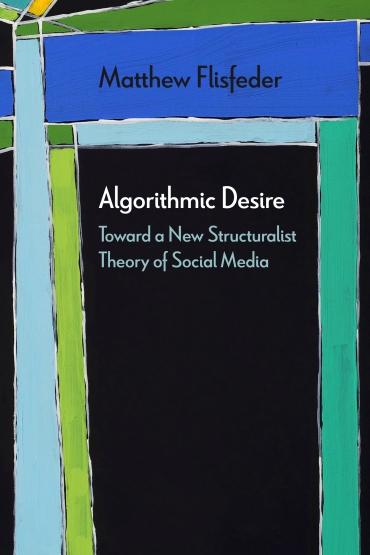
Northwestern University Press (2021)
Reviewed in the Postdigital Science and Education, Journal of Extreme Anthropology and Psychoanalysis, Culture & Society
Symposium on Algorithmic Desire in Rethinking Marxism
In Algorithmic Desire, Matthew Flisfeder shows that social media is a metaphor that reveals the dominant form of contemporary ideology: neoliberal capitalism. The preeminent medium of our time, social media’s digital platform and algorithmic logic shapes our experience of democracy, enjoyment, and desire. Weaving between critical theory and analyses of popular culture, Flisfeder uses examples from The King’s Speech, Black Mirror, Gone Girl, The Circle, and Arrival to argue that social media highlights the antisocial dimensions of twenty‑first century capitalism. He counters leading critical theories of social media—such as new materialism and accelerationism—and thinkers such as Gilles Deleuze and Michel Foucault, proposing instead a new structuralist account of the ideology and metaphor of social media. Emphasizing the structural role of crises, gaps, and negativity as central to our experiences of reality, Flisfeder interprets the social media metaphor through a combination of dialectical, Marxist, and Lacanian frameworks to show that algorithms may indeed read our desire, but capitalism, not social media, truly makes us antisocial. Wholly original in its interdisciplinary approach to social media and ideology, Flisfeder’s conception of “algorithmic desire” is timely, intriguing, and sure to inspire debate.
“Algorithmic Desire is an extraordinarily rich, erudite and theoretically dazzling analysis of late capitalism as metaphorised by Twitter and its confederates. It shows how this new mediascape, taking over from television, harnesses our desire to production in new ways, cultivating us as entrepreneurial, neoliberal subjects. It is also, rather surprisingly, a convincing defense of the utopian kernel in the idea of ‘social media.’ While the platforms never live up to their name, while they nurture forms of pervasive anti-sociality, while they impose their own rhythm on our lives and our enjoyments for the sake of profit, Algorithmic Desire shows that the idea of a truly social media is ultimately subversive. It exhorts us to hold onto this image and push it all the way to its limits, so that we can learn how to turn social media into a living reality. A really marvelous and thoughtful book.” —Richard Seymour, author of The Twittering Machine
“Algorithmic Desire is not theorizing some trivial TikTok influencers. The internet does not merely transport news, selfies and emojis; it embodies a new totality. Flisfeder takes us on a voyage around his library, investigating social media as a transcending historical force. His conclusion: the revolution will not be a trending topic.” —Geert Lovink, author of Sad by Design: On Platform Nihilism
“Algorithmic Desire is an indispensable ideology critique of digital capitalism. It is an excellent analysis of digital platforms and algorithmic logic that uses critical theory, especially Marxist theory and Lacanian psychoanalysis.” —Christian Fuchs, author of Social Media: A Critical Introduction
“Matthew Flisfeder’s recent contribution to literature on social media within psychoanalysis and critical theory is less a variation on the well-versed theme than an ingeniously crafted statement, deserving the praise and attention both by those within and outside of the field . . . a crucial waymark in redeeming the locus of subjectivity that has gone missing from much of contemporary critical theory.” —Lukas Mozdeika, Journal of Extreme Anthropology
“It is still common to read how social media is ruining society, how alternative social media platforms should be created… but Flisfeder unsettles this terrain, approaching social media not as the endpoint of politics, but rather the beginning point… Flisfeder’s interpretation of social media reveals significant trends of capitalism toward the self-objectification of subjects, the incorporation of critique and resistance into the system, and perversion as the dominant libidinal structure.” —Alois Sieben, Psychoanalysis, Culture & Society